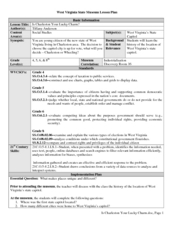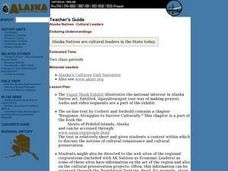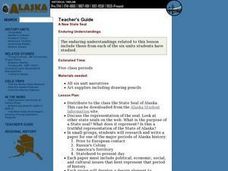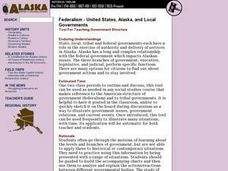Curated OER
What's Eating Your Ship?
Students examine the processes that contribute to the deterioration of shipwrecked in shallow and deep water. In this research lesson students explore shipwrecks and how the deterioration process works. Students fill out the questions...
Curated OER
Is Charleston Your Lucky Charm?
Students determine what makes Charleston, West Virginia unique. In this West Virginia history lesson, students explore the West Virginia History Museum to identify why Charleston became the capitol of the state.
Curated OER
Technology of War Questions
In this Canadian history activity, students read Canadian History, by Ian Hundey and then respond to 7 short answer questions about war technologies.
Curated OER
Lesson Plan on Intellectual Property: Combating Piracy in China
Students determine how counterfeit goods undermine the economy. In this global issues instructional activity, students examine economic principles. Students discuss how international piracy and property rights undermine trade as they...
Curated OER
The Reign of Terror
In this French Revolution worksheet, learners read a 1-page selection about the Reign of Terror, examine the listed Web sites about the topic, and then respond to 10 short answer questions about the information presented.
Curated OER
Magna Carta Student Worksheet
For this individual rights worksheet, students read a 1-page selection as well as Internet articles about the Magna Carta and then respond to 8 short answer questions.
Curated OER
Social Studies Test-Grade 5
For this grade 5 social studies test, 5th graders complete a 27 question multiple choice quiz covering a variety of grade 5 concepts.
Curated OER
Alaska Native - Cultural Leaders
Students research, write about and discuss the Alaska Natives.
Curated OER
Dynamic Nature of Culture
Students research and discuss some of the changes that have occurred in Alaska over the last 50 years and how the changes have impacted Alaska Native cultures.
Curated OER
Education and Self Determination
Students read and discuss a section from Encyclopedia of North American Indians. They select and locate various sources to red/listen to and take notes on.
Curated OER
A New State Seal
Students select one letter from "Letters to Howard" and write a response to the editor or an imaginary dialogue they might have had with the authors of these letters.
Curated OER
AK Natives Create New Political Organizations
Learners complete "Political Relations", an activity then read about it and correct their activity as necessary.
Curated OER
Fish Traps Roundtable
Students study and simulate the lack of representation of Alaska in the US Congress until 1912. They study Alaska's self-government with the creation of the territorial legislature of 1912.
Curated OER
Federalism - United States, Alaska, and Local Governments
Students research Alaska's state, local, and tribal governments, as well as Alaska's long and complex relationship with the federal government.
Curated OER
Alaska Native History Acronyms
Students study term associated with Alaska Native history and contemporary societies. They focus on trends and themes related to Alaska Native history.
Curated OER
Debate - Election of 1876
Eleventh graders examine how Rutherford Hayes should be elected President of United States in order for the Union to continue effective Reconstruction.
Curated OER
Philanthropic Movements in the United States To 1900: The Bill of Rights
Middle schoolers translate the meanings of and draw illustrations depicting the Bill of Rights amendments. They discuss how philanthropy is enabled by the Bill of Rights.
Curated OER
Sizing Up Hail
Learners participate in an estimation and measurement activity to improve their estimates of the size of hail. They hold several different sized wooden balls and record their guesses of the ball's diameters. They compare their estimates.
Curated OER
Government Lesson Plan: Lesson Plan 6
Students examine legislation on immigration policies. They discuss current immigration laws, read a handout, complete a chart, and answer discussion questions.
Curated OER
The Wrecks of Urca de Lima and San Pedro
Young scholars complete a variety of activities that go along with the study of and possible fieldtrip to Urca de Lima and San Pedro wreck sites in St. Lucie and Monroe Counties in Florida. They discuss the importance of preserving such...
Curated OER
Groundwater: Cleaning Up
Students research the various aspects of groundwater contamination that threaten health and human safety. They create a model and display that informs other about the health and safety risks. Students illustrate ways in which these...
Curated OER
TECH:Photovoltaics
Young scholars identify uses of photovoltaic solar cells in our society today. They discover the potential of solar cells by using them to produce electricity in different applications. In addition, the make observations and measurements.
Curated OER
Feudal Japan: Shogun
Students discuss the position attained by the shoguns of feudal Japan, who replaced the emperor as the main source of political power and examine how this power was reflected in art.
Curated OER
Inflation and Money
Students define money in terms of its functions and refer back to discussion of markets and the role of money in reducing transaction costs. They give examples of types of money.

























